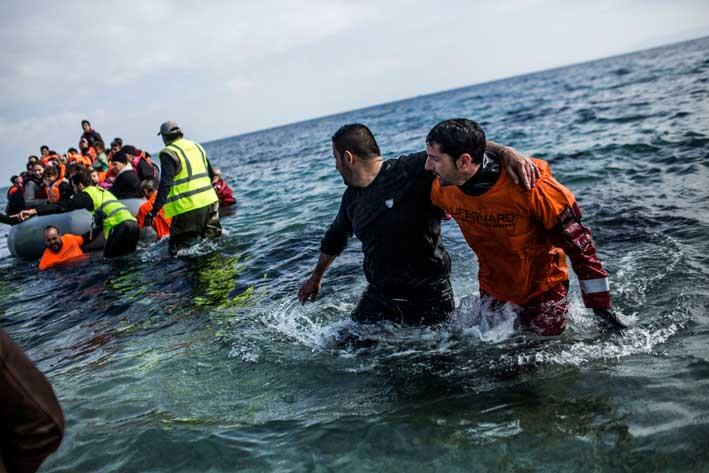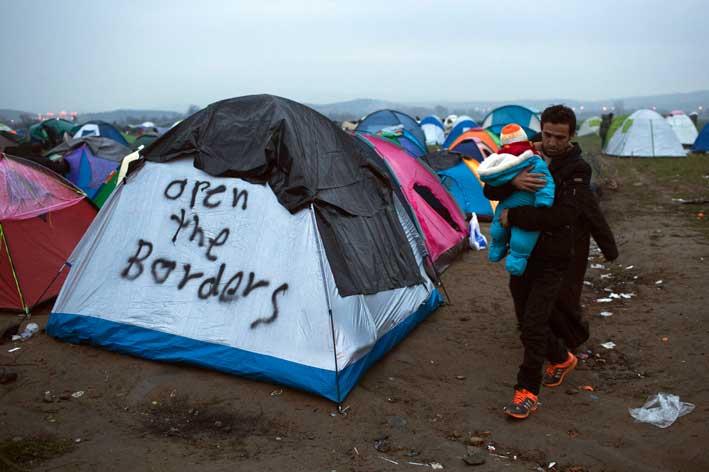BusinessMed represents the business community in 19 southern and northern Mediterranean countries, namely: France, Spain, Cyprus, Italy, Algeria, Tunisia, Morocco, Turkey, Greece, Jordan, Palestine, Syria, Lebanon, Israel, Egypt, Mauritania, Germany, Serbia and Portugal.
Mr Sarraf spoke about the refugee problems facing his home country, Lebanon. “Lebanon is a small country with four million residents sharing a border with Syria, which has 22 million. They can enter Lebanon without a visa due to an agreement between Lebanon and Syria. It’s the same with Jordan. Turkey used to offer free access without a visa until recently.

“The refugee problem is huge. There are a vast number of refugees In Lebanon and Turkey. While Iraq has no visa problems and refugees can access the country easily, refugees don’t go there as there are no job opportunities. They came to Lebanon because there are job opportunities. For a population of four million that has 1.5 million refugees, how can we generate job opportunities for them? It’s not easy. Previously, we had a 200,000 limit on refugees. We wanted to close the door but Europe said we couldn’t do it as it’s not humanitarian. Ok then, give us money to help these people. We need at least $2-3 billion to support the 1.5 million refugees in Lebanon. You cannot imagine the conditions these people are living in”.

“They move out from Lebanon, to where, Cyprus? They close the border. To Greece, they move to Europe. The same thing happened between Libya and Malta. Solving the political crisis is the right way to tackle the situation, there is no other way. Most Syrians will tell you they are not happy moving to Europe, as they don’t have the level of education to live in Europe, it’s not easy for them. But at the same time they are faced with a choice. Either go to Europe or stay in Syria and be killed there.”
Asked whether he believes the EU has let down border countries (including Lebanon, etc.), he said that in WWII, 40 million Europeans were moving around Europe, a large number leaving their country and going somewhere safer. They went to Lebanon and Algeria for example. “At that time nobody discussed a refugee problem, as it was a peace problem. After it was solved, most of the different peoples returned home.”
He said there are countries in Europe, such as Belgium and France that are important models which have incorporated a number of different cultures, with many, for example, second and third generation Moroccans and Algerians now forming part of their populace and who now consider themselves European. “This model, however, is creating a problem as many other European countries do not want to have this scenario.”

Speaking about the 1995 Barcelona Agreement, he explained that it was an intergovernmental political agreement based on security. “The private sector had a role to play, to join the public sector on economic issues.
One of the main principles of the Barcelona Agreement was free trade.
“In 1998, the 22 members of the Arab League signed an Arab Trade Agreement to abolish Customs duty between Arab countries, which took five to ten years.
“When the Euro-Mediterranean agreement was concluded, it was signed depending on the country. In 1995 for example, Tunisia sent applications straight away. Morocco took some more time and Lebanon took 10 years. Case by case, the Barcelona Agreement has been implemented as a free trade agreement by a reduction of a different percentage of Customs duty. Today, for example, most Mediterranean goods enter our market (Lebanon) with almost zero tax Customs duty.”

Asked about the areas of economic cooperation which could be bolstered by northern and southern Mediterranean countries working together, he replied, “The best model is complementarity and vision” and mentioned Malta as an example. “The Prime Minister of Malta spoke of the vision he has. Malta today is a technological hub and is heavily supporting this via developments in Malta, inviting technological companies to be present in Malta. Is he successful? Yes, very much so. How is he doing this successfully? By supporting good connections with different Mediterranean countries. As an example, a Lebanese businessman would come to Malta to create strategic partnerships with Maltese companies or an international company present in Malta. The Prime Minister’s objective was to create jobs for the Maltese.”
Malta is also a pharmaceutical hub. “The Prime Minister wanted to create a complementary strategy with other countries. It’s not mass production, it’s a brain production. He said ‘let’s have people with brains focus on research and development in pharmaceuticals and in technology’. In North Africa, I cannot see Libya, Morocco, Algeria etc. move into the technology sectors. Instead of competing with them, the Prime Minister chose the complementary approach. Let’s talk about the South-South – Lebanon, Syria, Jordan. We come here, take the products and developments and sell them in the Gulf countries. Malta is the hub for Europe and countries like Lebanon are the hub for the Gulf region.” He described the link as a chain.

With regard to foreign direct investment in countries on the southern Mediterranean border, he said that today there is a crisis. “While it is not yet similar to the 1928 and 2008 crises, it can result in the accumulation of both of them in one.”
He spoke about the price of fuel in this regard. “Where originally the profits would be invested in different markets as part of a strategy, this is on hold due to the price of petrol dropping significantly. Investment will not be an easy task in the coming years. We need to be on the geopolitical stage and look at regional investment rather than one-market investment. You need time to understand what will happen politically between countries. If people want to invest they would want, at the very least, to have security in their investment. For this reason, I believe we will suffer with investment in the coming years.
“For the Middle East region there is also the ISIS problem and there is no positive view that the problem is close to solution. The USA and Russia are trying to tackle this; Europe is outside just watching, involved with its own problems, and all these factors together will not help with investment.”
Mr Sarraf spoke highly of Malta. As Chairman of Malia Holding, he said he is considering investing in Maltese sectors, but would not say more about a possible investment until everything is finalised.